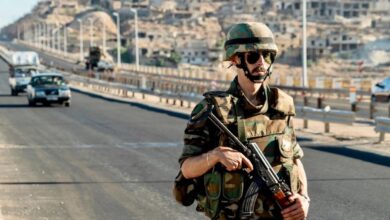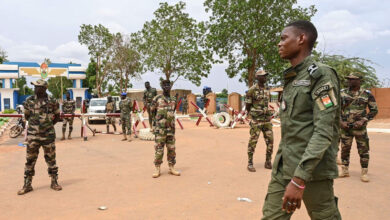‘We can’t lose hope’ – SDF willing to work with US despite ‘huge blow’ in northeast Syria
The US ‘should not have opened the door’ to Turkey, Syrian Kurdish leader Ilham Ahmed says. ‘Ethnic cleansing is happening in the region.’
In a last-ditch appeal, senior Syrian Kurdish Ilham Ahmed leader called on the U.S. government to halt Turkey’s invasion of northeast Syria and said that the Syrian Democratic Forces are willing to continue working with the United States if some American troops remain in the country.
During an interview with The Defense Post in Washington on Monday, October 21, Ahmed, President of the Executive Committee of the Syrian Democratic Council, said that her side dismantled defenses along the Turkish border because American military and political representatives had repeatedly assured them that the U.S. would not allow anyone to “threaten” SDF-controlled areas.
“We did not trust the Turks,” Ahmed said. “But we trusted our American allies, because they always used to say they would never let anyone threaten our area.”
Under U.S. guidance, the SDF pulled back from the border in an effort to ease tensions with Turkey, which has threatened for months to invade in order to destroy the predominantly-Kurdish People’s Protection Units (YPG), the backbone of the SDF.
“That is why we accepted the security mechanism, so that maybe we can open the door to dialogue [with Turkey] and arrive at a long-term solution,” she said.
But on October 9, Turkey launched an incursion against the SDF, just days after a phone call between President Recep Tayyip Erdogan and U.S. President Donald Trump.
U.S. officials insist Trump did not give Erdogan a “green light” to invade, but that he ordered U.S. forces out of harm’s way after Erdogan insisted the assault was imminent.
U.S. troops had earlier begun joint ground and air patrols with Turkish forces inside Syria as part of a “security mechanism” aimed at protecting the SDF from a Turkish incursion.
Ankara considers the YPG to be a terrorist organization inextricably linked to the Kurdistan Workers Party (PKK) that has waged a decades-long insurgency inside Turkey.
Still, Ahmed said, U.S. officials never said they would be willing to militarily defend the SDF if Turkey attacked.
“They always said they needed to keep a balance in their relations,” she said.
“The withdrawal in this way, opening the door to Turkey, was a huge blow to the efforts we made together to fight terrorism in the region.”
Turkey’s incursion has so far led to the displacement of at least 165,000 people, according to the United Nations, and at least 300 killed, according to Ahmed. It also led the U.S. to announce a full withdrawal of forces from the country.
Ahmed arrived in Washington on Saturday in the hope of convincing the U.S. government to stop Turkey’s incursion and leave some troops behind. Ahmed and James Jeffrey, who is both the U.S. Special Representative for Syria Engagement and the Special Envoy for the Coalition against ISIS, will appear before separate Congressional committees on Wednesday.
U.S. Vice President Mike Pence announced a temporary ceasefire on Thursday after meeting Erdogan in Ankara. Under the agreement, Turkey agreed to halt its attacks between Ras al-Ayn and Tal-Abyad, if the YPG withdrew from the area to a depth of 32 km over the next five days, Pence said on Thursday.
SDF commander General Mazlum Abdi said his forces would abide by the ceasefire, but the force has accused Turkey of various violations throughout the weekend, mostly in Ras al-Ayn. A spokesperson told The Defense Post on Sunday that the SDF finished pulling out of the besieged border town.
But Mazlum said the SDF will not accept Turkish control over the area or resettlement of some two million refugees, mostly Arabs, as Erdogan has repeatedly threatened.
“For us this is not acceptable,” Ahmed said, adding that the SDF only agreed to withdraw out of an “ethical duty” to stop the onslaught. “There [were] many people trapped, besieged in Ras al-Ayn. We wanted to save their lives,” she said.
Asked about Trump’s comment that Turkey had to ‘clean out’ the border area northeast Syria, Ahmed said it seemed as if the American president was endorsing ethnic cleansing.
In spite of this, Ahmed said the SDF is still willing to cooperate with the U.S. on future counter-terror operations. She called on the Trump administration to stop Turkey’s invasion from going any further, and to use what leverage it has to get Turkey-backed rebel forces out of northeast Syria.
“Our area is occupied by terrorist groups under the name of the National Army. They are actually terrorists, but they changed their names,” she said. “Turkey founded a new ISIS in the name of the Syrian National Army.”
“The whole area is destroyed, city infrastructure. Ethnic cleansing is happening in the region between Sere Kaniye and Tal Abyad.”
“If they can’t protect us, then they shouldn’t have opened the door,” Ahmed said. “If they open more space for Turkey, then the U.S. will not have any role in Syria in the end.”
Turkey’s incursion has pushed the SDF to cut a deal with the Syrian government, which U.S. officials repeatedly discouraged.
Ahmed said that so far, the agreement between the Syrian government and the Kurdish leaders only pertains to mutual defense. Small numbers of Syrian government troops have entered Manbij, Tabqa, Kobane and border areas of the northeast, but do not control any cities.
People in Manbij on Sunday announced a general strike to protest the Syrian government’s potential return. Asked what her administration can say to those who do not want the regime to return, Ahmed declined to comment.
The Autonomous Administration of North and East Syria has sought a change in the Syrian government’s constitution to ensure political autonomy for the northeast, but the planned withdrawal of U.S. forces left them with little leverage.
Ahmed said political discussions with the Syrian government will commence soon, and that her administration will demand “a guarantee of the rights of the region’s people in the [Syrian] constitution.”
“It’s hard,” Ahmed said. “But we can’t lose hope.”
INTERVIEW: Kurdish leader Ilham Ahmed on security in North and East Syria












